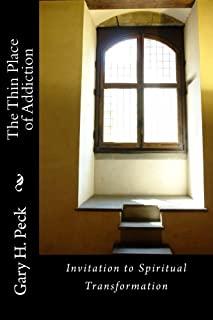
Peck, Gary H.
product information
description
in which we live. The human tendency is to attach ourselves to things and behaviors that provide pleasure, escape, and meaning. We are driven by our loneliness, boredom, and feelings of insignificance. We fall into behavior patterns that become habits and ultimately find ourselves shackled with chains of addiction. The title of this new book, The Thin Place of Addiction: Invitation to Spiritual Transformation, suggests that finding ourselves in this trapped, desperate, seemingly hopeless condition of habit and addiction may perhaps turn out to be a blessing if we allow our brokenness to turn us inward and upward. In the Celtic tradition a thin place is somewhere in which we especially sense the presence of the Divine. Like a thin place in the ice of a pond through which heavenly shafts of light penetrate into the dark cold waters below, this thin place in our life journey is an opportunity to encounter the Divine - to experience spiritual transformation - if we but swim towards the light. It has been suggested that often we don't look up until we hit bottom. Addiction can serve as this bottoming-out experience, the thin place in our self-sufficient life where we realize our need for Divine engagement. Therefore, this book is not so much about turning away from something as it is of turning towards something (or Someone). It is meant to be about discovery. This book has not been written with a specific type of addiction or habit in mind. There are plenty of addiction-specific books out there. Idolatry is really at the root of addiction. People, things or behaviors take on an importance that is out of proportion in our lives. We look to these people, things or behaviors to provide us with something they were never intended to give. Whether it be our homes or possessions (materialism), past-times and pursuits (our own creativity and talents), careers and accomplishments (success and reputation), food/drink, sex, or artificial substances (pleasures), or families, friends, spouses/lovers (relationships) - none of these are capable of providing ultimate meaning in and of themselves. And yet we so naturally attempt to build our lives around them. This book is an invitation to embark upon a journey to find ultimate meaning, fulfillment and responsible freedom so that we can enjoy the good things of this world without unhealthy attachment. In the research literature one finds something referred to as the Stages of Change Model. With regards to an addictive behavior or habit, people are usually in one of six stages: Pre-contemplation (not ready to quit); Contemplation (thinking about quitting); Preparation (ready to quit); Action (quitting); Maintenance (staying quit); Termination (living quit). With regards to spiritual growth and development, the Christian mystical traditions also speak of stages: Awakening, Conversion, Purgation, Illumination, and Union. As a person moves through these stages he/she is growing stronger spiritually, becoming more centered upon the Divine. While it may be true that usually the spiritual stages are representative of a person's life journey as a whole, they may also represent the changes necessary for a person to move from one unique area of brokenness to a place of healing, freedom, and life. This book will illustrate how these psychological and spiritual models of change complement one another.
member goods
No member items were found under this heading.
Return Policy
All sales are final
Shipping
No special shipping considerations available.
Shipping fees determined at checkout.







